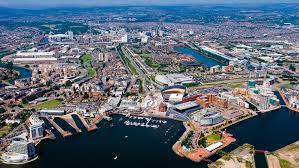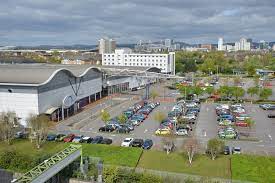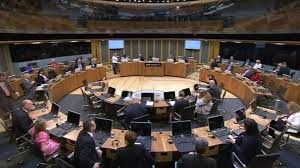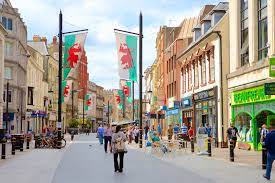- Dark speak easy part one - 18th February 2026
- X marks the spot again - 17th February 2026
- Wordy again part three - 16th February 2026

Covering major economic or political changes has always been central for our Editor, Welshman Phil Parry, and the latest figures appear to show that Wales’ capital city is booming, and that it MAY be a long-term effect of devolution.
Earlier Phil has described how he was helped to break into the South Wales Echo office car when he was a cub reporter, recalled his early career as a journalist, the importance of experience in the job, and making clear that the‘calls’ to emergency services as well as court cases are central to any media operation.
 He has also explored how poorly paid most journalism is when trainee reporters had to live in squalid flats, the vital role of expenses, and about one of his most important stories on the now-scrapped 53 year-old BBC Wales TV Current Affairs series, Week In Week Out (WIWO), which won an award even after it was axed, long after his career really took off.
He has also explored how poorly paid most journalism is when trainee reporters had to live in squalid flats, the vital role of expenses, and about one of his most important stories on the now-scrapped 53 year-old BBC Wales TV Current Affairs series, Week In Week Out (WIWO), which won an award even after it was axed, long after his career really took off.
He has disclosed as well why investigative journalism is needed now more than ever although others have different opinions, how the coronavirus (Covid-19) lockdown played havoc with media schedules, and the importance of the hugely lower average age of some political leaders compared with when he started reporting.
Phil has explained too how crucial it is actually to speak to people, the virtue of speed as well as accuracy, why knowledge of history and teaching the subject is vital, how certain material was removed from TV Current Affairs programmes when secret cameras had to be used, and some of those he has interviewed.

Sometimes long-term effects can be unforeseen, but enormous.
For example when I covered the devolution referendum in 1997, I saw it purely as a political event and, personally, I was ambivalent about it.
It now appears, though, that years down the line the ECONOMIC effect is coming to fruition, and it is POSITIVE!
Let’s look at the example of Cardiff.
As anyone who travels round the city today knows, after viewing all the new building underway – Wales’ capital is BOOMING.
The city is expanding more than at any other time in its history, with housing developments, apartment blocks, and offices going up all the time!


It should not be under-estimated how important Cardiff is to Wales.
Its economy (and that of adjacent areas) makes up nearly 20 per cent of Welsh GDP, with 40 per cent of the city’s workforce being daily commuters from the surrounding South Wales area.

It seems that this growth could be to do with the fact that major companies want to have a Welsh base when the country has its own parliament, and, of course, they turn then to its capital city.
It is hugely ironic that Cardiff has benefitted from devolution, because it voted by a massive margin AGAINST having an assembly/parliament.
Indeed Welsh devolution itself was only accepted narrowly in 1997 – just 50.38 per cent of those who voted were in favour, with 49.70 per cent against.

But a few years after this seismic event, the economic effects for Cardiff started to be felt, and is now greater than ever.
The Atlantic Wharf area of Cardiff will be completely transformed over the next few years with more than 1,000 new homes, entertainment and cultural attractions, hotels, offices, and a public square.

Cardiff Council published its masterplan in 2020 for a 30-acre site stretching from its County Hall headquarters to the Red Dragon Centre across to Lloyd George Avenue and down to the Flourish, where Bute Place meets the Wales Millennium Centre and Roald Dahl Plass.
A massive new metro system is being built (estimated in 2018 at £738 million), along Lloyd George Avenue, which will link the centre with Cardiff Bay.
Cardiff’s large-scale re-development at the beginning of the 21st century turned the city into a far more popular destination for foreign visitors, too, which also had an enormous economic impact.

The most foreign tourists come from France and Republic of Ireland, with Cardiff the fifth most visited UK city by Australians.
According to VisitBritain a few years ago: “Visitors told us that the attraction of Cardiff as a glorious capital city, with an historical resonance, was the reason for visiting”.
Now the city is even more popular – both with visitors from overseas, as well as major firms.

It seems that devolution may have been good for Wales after all, and it hasn’t just created a ‘talking shop’!
The memories of Phil’s extraordinary decades long award-winning career in journalism (including major events like these) as he was gripped by the rare neurological disabling condition Hereditary Spastic Paraplegia (HSP), have been released in a major book ‘A Good Story’. Order it now.

Another book, though, has not been published, because it was to have included names.
Tomorrow – why Phil is heartened to see details emerge of the Queen praising journalists for exposing domestic abuse, but dispirited that she did not highlight the insults hurled at those very same journalists for doing that job.









